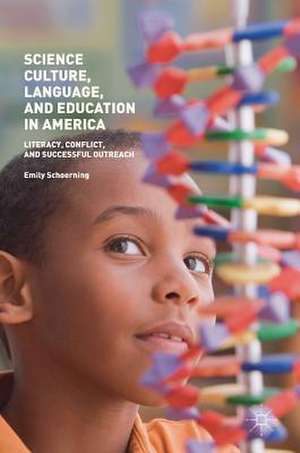Science Culture, Language, and Education in America: Literacy, Conflict, and Successful Outreach
Autor Emily Schoerningen Limba Engleză Hardback – 31 mai 2018
| Toate formatele și edițiile | Preț | Express |
|---|---|---|
| Paperback (1) | 372.96 lei 6-8 săpt. | |
| Palgrave Macmillan US – 25 iul 2019 | 372.96 lei 6-8 săpt. | |
| Hardback (1) | 379.01 lei 6-8 săpt. | |
| Palgrave Macmillan US – 31 mai 2018 | 379.01 lei 6-8 săpt. |
Preț: 379.01 lei
Nou
Puncte Express: 569
Preț estimativ în valută:
72.57€ • 75.57$ • 60.21£
72.57€ • 75.57$ • 60.21£
Carte tipărită la comandă
Livrare economică 14-28 februarie
Preluare comenzi: 021 569.72.76
Specificații
ISBN-13: 9781349958122
ISBN-10: 1349958123
Pagini: 167
Ilustrații: V, 159 p.
Dimensiuni: 148 x 210 mm
Greutate: 0.35 kg
Ediția:1st ed. 2018
Editura: Palgrave Macmillan US
Colecția Palgrave Macmillan
Locul publicării:New York, United States
ISBN-10: 1349958123
Pagini: 167
Ilustrații: V, 159 p.
Dimensiuni: 148 x 210 mm
Greutate: 0.35 kg
Ediția:1st ed. 2018
Editura: Palgrave Macmillan US
Colecția Palgrave Macmillan
Locul publicării:New York, United States
Cuprins
1. Where Are We Now? Where Could We Be?.- 2. The Culture of Classroom Science: Discourse, Dialog, and Language Practices.-3. Nature of Science Misconceptions: A Source of Cultural Conflict.- 4. Culture and Conflict: Science and Social Controversy.-5. Science and Religion: Meshing and Conflicting Worldviews.- 6. A Case Study in Transforming Communities: The Science Booster Club Program.
Notă biografică
Emily Schoerning is a research scientist at the University of Iowa, USA. She is also the elected Research in Science Education Division Director for the National Science Teachers Association.
Textul de pe ultima copertă
Can the culture and language of science be an alienating force that discourages marginalized people from identifying with scientists and pursuing higher education in the sciences? More broadly, does an education system which unwittingly presents science as a distinct culture result in a population susceptible to doubt, confusion, and denial? This volume explores how this 'culture of science' is reflected and transmitted in the classroom, and how this can have wide-reaching and often negative implications for science education and science literacy. Well-intentioned efforts to bring hands-on scientific experiences into the classroom must also take into account how students perceive the culture of science. Areas of potential conflict include linguistic and cultural behaviors, misconceptions about science and the nature of science, and, in some cases, religious worldviews. Once recognized, these conflicts are resolvable, and valid methods exist to reduce alienation, broaden participation, and ensure that all students, whether or not they pursue STEM careers, leave school knowing that science is something that they can trust.
Caracteristici
Explores how science culture can be alienating to marginalized people Discusses how to present science education clearly and accessibly Presents findings related to the education of both children and adult learners
